King’s Showcases Groundbreaking Digital Art by Women in Tech
GLOW: Illuminating Innovation is a new exhibition led by Sarah Atkinson, Professor of Screen Media, as part of an AHRC-funded fellowship.
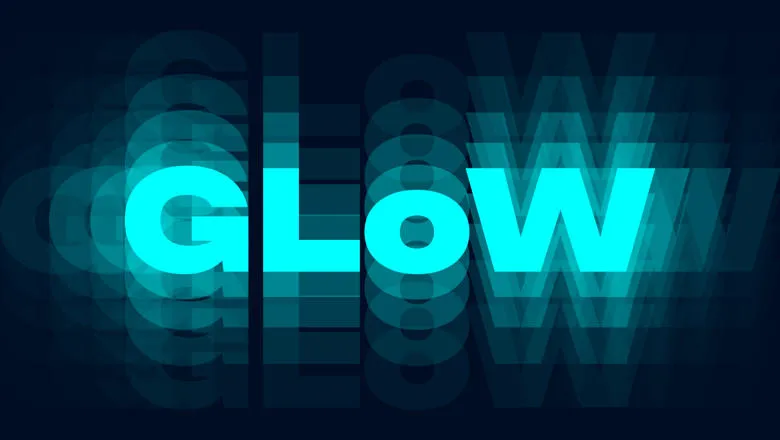
GLOW: Illuminating Innovation, a new exhibition showcasing groundbreaking digital creativity by women in technology, will open at King’s on International Women’s Day, 8 March. A curation of brand-new artworks alongside historical works spanning five decades will be on display in multiple locations across the Strand campus until 20 April.
GLOW: Illuminating Innovation is presented by King’s Culture with support from King’s Digital Lab and the Virtual & Immersive Production Studio at the University of Nottingham.
From Ada Lovelace, known as the first computer programmer, and Hedy Lamarr, the ‘Mother of Wi-Fi’, to Katherine Johnson, the mathematician who did the calculations for the first Moon landing in 1969, and ‘Mother of the Internet’ Radia Perlman, women have changed the world of technology with their inventions and discoveries. But how much do we know about women in digital art? Women artists have been at the forefront of the first Virtual Reality (VR) and Augmented Reality (AR) explorations, they have been leading the development of computer and 3D animation, they have redefined the scene of video art – and this exhibition shines a light on their important contributions.
GLOW chronicles the impact of women developing groundbreaking technologies through artistic creativity and experimentation. It highlights the pivotal role women have played in propelling technological advancements into mainstream use and serves as a powerful testament to the previously untold stories of women trailblazing innovation.
The excavated histories of women innovating in early film production and computer technologies reveal that as the technology becomes established and commodified, women’s histories are rapidly erased as narratives of male pioneers dominate. GLOW shines the light on the names, innovations and creative discoveries that have remained in the shadow despite having had major impacts on the evolution of technology and art.
Professor Sarah Atkinson, GLOW curator and AHRC fellow
The exhibition features historical artworks, including Hunger in LA (2012) by Nonny de la Peña, ‘Godmother of VR’, as well as four brand new commissions which include AR experiences, 3D animations and sculptures, and a major immersive installation. These newly commissioned works are the culmination of a 6-month artist programme led by Professor Sarah Atkinson.
Leanne Hammacott, Head of Programming, King’s Culture said:
“It has been a fascinating journey to work with these incredible women artists, who are at the forefront of creative digital practice, and who connect seamlessly with their pioneering forbears. This is a story that King’s can amplify beautifully through its research collaborations and through the amazing range of platforms on the Strand.”
Julia Gillard, former Prime Minister of Australia and Chair of the King’s Global Institute for Women’s Leadership, said:
The presence and profile of women in technology on the main stage is diminishing, with ever-decreasing levels of funding reaching women founders of tech companies and far fewer women entering and retaining roles in the workforce. Even less are in visible leadership positions. To shine a spotlight on the remarkable contributions of women in this area, I’m delighted to be welcoming leading women artists whose work has inspired and informed pioneering new technologies, to celebrate the launch of the new GLOW: Illuminating Innovation exhibition.
Julia Gillard, Chair of the King’s Global Institute for Women’s Leadership
GLOW: Illuminating Innovation will feature artworks by:
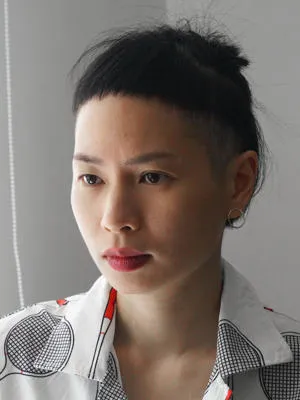
Yarli Allison
Yarli Allison, a Hong Kong-Canadian born, London-based artist with an interdisciplinary approach that traverses sculpture, installation, CGI (VR/AR/3D modelling/game), moving images, drawings, poetry, tattooing, and performances. Yarli’s recent works were exhibited at Tai Kwun Contemporary Museum (HK), LINZ FMR (Austria), FACT (Liverpool), Barbican Centre (London), Institute of Contemporary Arts: ICA (London), V&A Museum (London).
Stem Cell Clinic <beta>, 2024 © Yarli Allison
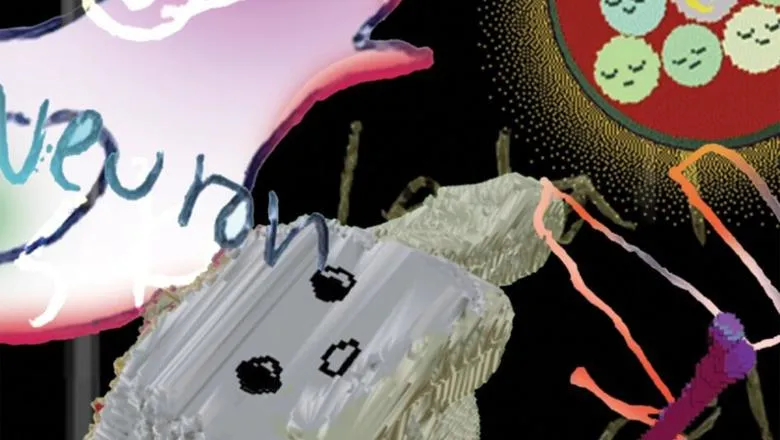 Credit: Yarli Allison
Credit: Yarli Allison
Multimedia installation with digital experience
Imagining a speculative (possible) future of our city entirely made of Embryonic Stem Cells, harvested from blastocysts in the uterus, this fictional clinic serves as the first entry point of Yarli’s long-term research in exploring possibilities of the usage of biotech innovation that could solve issues on gender health gap and heal damaged ecologies.

Violeta Ayala
Violeta Ayala, a Bolivian-Australian Quechua filmmaker, artist and technologist. Co-founding unitednotions.film and koa.xyz, Violeta has been instrumental in driving innovative projects. In 2020, she became the first Quechua member of the Academy of Motion Picture Arts and Sciences. Currently, Violeta is working with character and metaverse creation through syntography, algorithmic art, and AI model training, pushing the boundaries of storytelling and artistic expression.
Las Awichas, 2024 © Violeta Ayala
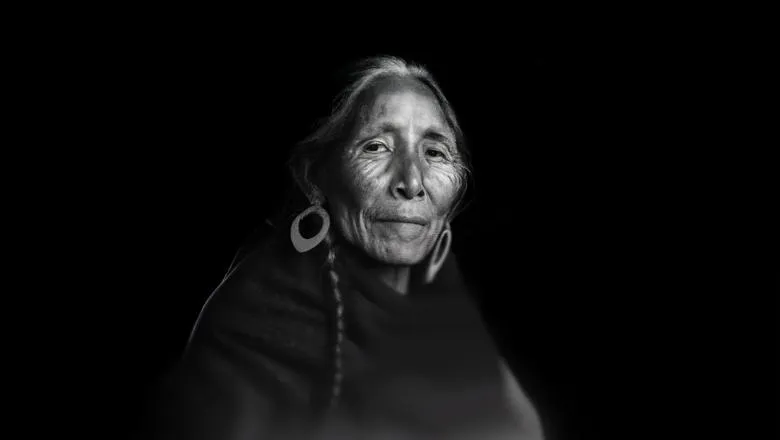 Credit: Violeta Ayala
Credit: Violeta Ayala
Portraits, Augmented Reality and Acrylic sculptures
Las Awichas immerses viewers in an interactive Augmented Reality (AR) installation where ancestral memories are reimagined through the lens of technology. Eight AI-generated grandmothers come to life through AR, each linked to their Andean animal spirit inspired by the Nazca lines. Las Awichas embodies Quechua’s fluid concept of time and the deep bond between the living and non-living. It weaves lost narratives by bringing the past into the present where reality and illusion intertwine.
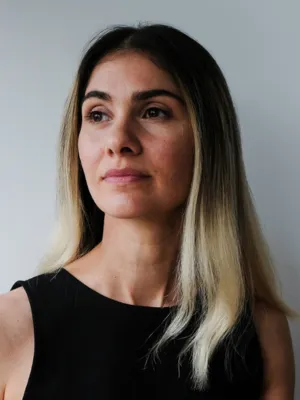
Lisa Jamhoury
Lisa Jamhoury, a Lebanese-American movement artist and programmer creating embodied, computational experiences. Rooted in contemporary circus and mindfulness, her practice includes interactive performances, installations, and websites that encourage a consensual, celebratory approach to humanity’s shared physicality. As an aerial acrobat, she has choreographed and performed across the United States. Supporters of her work include Ars Electronica, Meta Open Arts, NEW MUSEUM / NEW INC, and New York University’s Interactive Telecommunications Program.
L’entrée, 2024 © Lisa Jamhoury
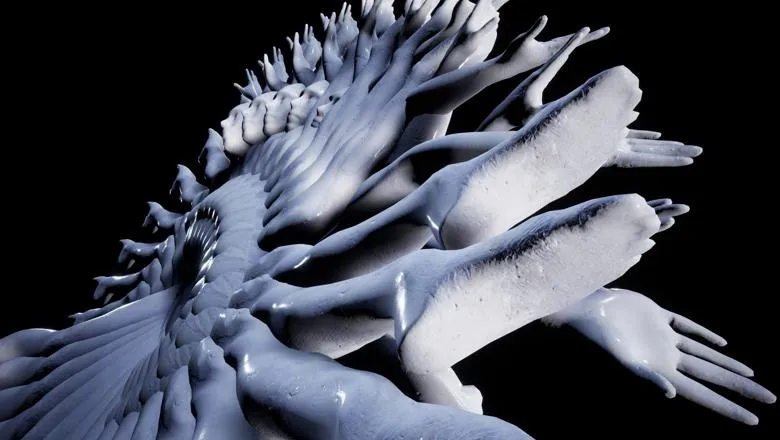 Credit: Lisa Jamhoury
Credit: Lisa Jamhoury
Augmented Reality and Acrylic sculptures
Amid the global migration between physical and virtual worlds, L’Entrée delves into the desire to capture, understand, and keep unchanged the vital human body. Part audio poem, part augmented reality (AR) experience, L’Entrée reveals a series of virtual sculptures situated in centuries of human movement along the newly pedestrianized area of Strand/Aldwych. The sculptures, created in a gaming engine with photogrammetry, motion capture, and computational averaging, each perform a virtual “dance” immersing viewers in their unique forms as spatial sound pulls listeners between the tangible streets of London and the intangible world of Web3/XR technologies.
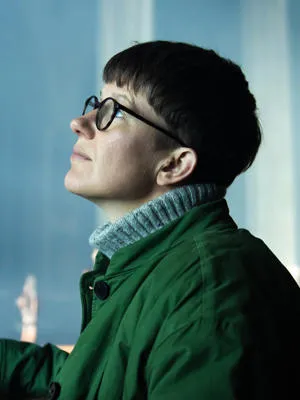
Rebecca Smith
Rebecca Smith, a UK-born visual artist practising under the name Urban Projections, has been drawing lines between the natural world, art and technology for over 20 years. Smith’s practice centres around the natural environment and our place within it, aiming to reaffirm our connection to nature and each other. Often through the creation of large-scale immersive experiences, Rebecca has developed innovative methods for taking digital arts out onto the streets.
Second Nature, 2024 © Rebecca Smith
 Credit: Rebecca Smith
Credit: Rebecca Smith
Volumetric Lighting and Immersive Audio Installation
Situated inside the St Mary le Strand church and drawing directly from the live environmental data generated by the many sensors that surround the Strand Aldwych space, colours, movement, speed, and sound will all be informed from large swaths of live data exchange. By taking information that is invisible to the human eye and presenting it in a way that seamlessly overlays with the public realm, the audience are invited to explore a dynamic perception of space, and to critically engage with issues of climate change and the environment.
GLOW: Illuminating Innovation is funded by an Arts & Humanities Research Council (AHRC) Research Development & Engagement Fellowship, King’s Culture, Faculty of Arts & Humanities, King’s Together, Faculty of Natural, Mathematical & Engineering Sciences, Faculty of Social Science & Public Policy, King’s Institute for Artificial Intelligence, AHRC Impact Accelerator and the Virtual & Immersive Production Studio at the University of Nottingham.

